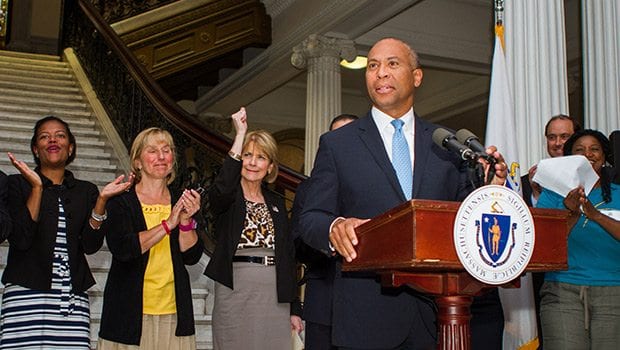
Elected officials and labor activists gathered at the State House last week to mark the signing of the Domestic Workers Bill of Rights, which extends basic work standards and labor protection to an estimated 67,000 nannies, caregivers, housekeepers and home workers in Massachusetts.

Natalicia Tracy, Executive Director of the Brazilian Immigrants Center in Boston
Natalicia Tracy, Executive Director of the Brazilian Immigrants Center in Boston said that the passing of this bill hit close to home for her. “I was practically enslaved for two years,” she said. “I was brought to the U.S. as a nanny at 17 with the promise to go to school, learn about a new culture and start a new life. I found myself working seven days a week for $25 a week, cooking, cleaning and taking care of children.”
The law guarantees that domestic workers get breaks and rest time for meals, work evaluations and termination notices. It also lays out their duties and state laws regarding what deductions employers can take out for food and lodging.
It also ensures basic workplace standards like 24 hours off once a week, guaranteed maternity leave and protects workers from discrimination, sexual harassment, illegal charging for food and board, unlawful eviction for live-in workers and from retaliation for asserting wage violations.
Massachusetts joins New York, California and Hawaii in passing domestic workers labor protection legislation.
“Domestic workers represent an important segment of our workforce and are important to the Massachusetts economy,” Gov. Deval Patrick said during the bill signing. “This bill ensures they have the same basic workplace rights that we guarantee other workers in Massachusetts.”
Tracy first got involved as a domestic workers advocate during the summer of 2010, after New York passed its own Domestic Workers’ Rights Bill.
“A lot of women experienced similar events and traumas working in homes,” Tracy said. “I feel the bill of rights will help workers have the tools to maintain a workplace with respect and dignity, where they have rights spelled out. There were no laws for domestic workers before this. It wasn’t even recognized as real job. We had no representation. Workers didn’t know what to ask for before the bill.”
Tracy said that many complaints and concerns poured into the Brazilian Immigrant Center from women in particular. They had experienced similar workplace mistreatment, sexual harassment and privacy invasions while working in people’s homes.
“Once we got a sense of how many people were affected by these problems, we began going to churches and local events, talking to people and organizing.” Tracy said that advocating for household workers is still a growing movement, but the signing of the Bill of Rights was a step in the right direction.
“This law will be able to educate employers and workers alike about rights, respect and dignity so people can have better quality of life. Happy workers are better workers. It is a win/win for all.”
Tracy credited Massachusetts AFL-CIO President Steve Tolman with opening the doors for the Domestic Workers’ Bill of Rights.
“Without their help, this would not have happened in such a quick and efficient way.”
Massachusetts Jobs with Justice Executive Director Russ Davis said that this ruling helps corrects unfair labor practices like the exclusion of farm workers and domestic workers from labor laws enacted in the 1930s. “It’s righting a historic wrong that excluded workers of color, partly because of a racist opposition at the time,” Davis said.






